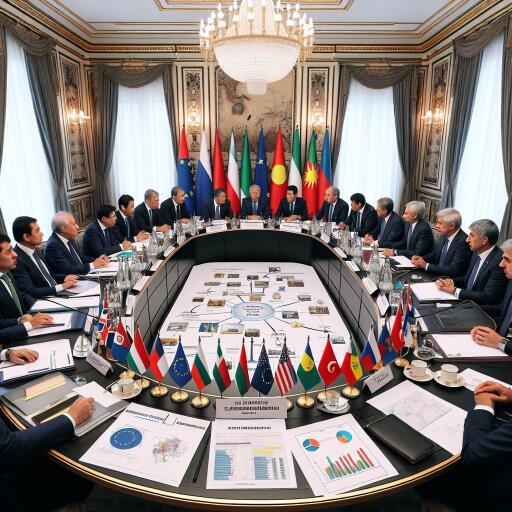Central Asian Ambassadors Forge Path for Energy and Economic Collaboration at Brussels Energy Club
On a notable occasion hosted by the Brussels Energy Club at TUSIAD in Brussels, ambassadors from the heart of Central Asia convened to deliberate on energy strategies and foster economic cooperation. The roundtable event emerged as a vibrant platform for exchanging insights on the pivotal role Central Asia plays in the global energy landscape and its expanding relationship with the European Union (EU).
Diplomats from Kyrgyzstan, Turkmenistan, Kazakhstan, Tajikistan, and Uzbekistan shed light on their countries’ energy policies, highlighting the myriad challenges and opportunities that lie ahead. Central Asia, bridging China and Europe, has carved a niche for itself, not just as a geographical juncture but as a crucial contributor to the Eurasian economy’s dynamism.
The push towards economic revival post-COVID has amplified Central Asia’s significance in international supply chains, especially along the Middle (trans-Caspian) Corridor. Investments amounting to billions of Euros in infrastructure underscore the region’s pivotal role in nurturing trade and economic expansion.
However, Central Asia’s allure isn’t confined to being merely a conduit for energy transport. Its abundance in critical raw materials and a hotbed for renewable energy initiatives, drawing considerable investments, especially from the Gulf countries, earmark the region for its growth potential in the energy sector. With a booming demand for energy, the pivot towards renewables is evident, notwithstanding the continued importance of fossil fuels.
Highlighting the shift towards a more sustainable future, Ambassador Aidit Erkin of Kyrgyzstan, underscored the nation’s dedication to renewable energy ventures, particularly in hydropower, solar, and wind energy sectors. Moreover, Turkmenistan’s Ambassador Sapar Palvanov detailed the country’s strategic move towards solar and wind energy, aiming to balance its economic reliance on natural gas with green energy initiatives.
Marking significant strides towards a sustainable future, Kazakhstan’s Deputy Ambassador Beibit Kulatayev shared the country’s ambitious goal of achieving carbon neutrality by 2060. With substantial investments in renewable energy, particularly solar and wind power, Kazakhstan is steadfast in its commitment to reducing its carbon footprint while strengthening its partnership with the EU on sustainable projects.
Tajikistan and Uzbekistan too echoed a similar commitment towards green energy, with plans to capitalize on their hydropower and solar energy potential, aiming to become frontrunners in renewable energy in the region. Particularly, Uzbekistan’s collaboration with international partners on innovative solar power projects stands as a testament to its resolve to diversify its energy mix.
The session illuminated the essence of regional cooperation in surmounting shared impediments and harnessing collective resources for energy independence and sustainability. Projects like the Central Asia South Asia Electricity Transmission and Trade Project (CASA-1000) spotlight the potential of cross-border collaboration in bolstering energy security.
The discourse also ventured into the financial landscapes shaping the transition to renewable energy. The ambassadors unanimously called for international financial backing and investment, proposing green bonds among other instruments as viable channels for funding sustainable energy projects.
The gathering in Brussels underscored Central Asia’s proactive stride towards an energy-efficient and economically robust future. With a shared vision for sustainable development, the collaborations and dialogue fostered during the event pave the way for Central Asia’s promising role on the global stage as a beacon of renewable energy and sustainable growth.
As Central Asian nations march ahead in refining their energy sectors, the collective focus on sustainability stands paramount in confronting the challenges posed by climate change while paving the path for enduring economic prosperity.
